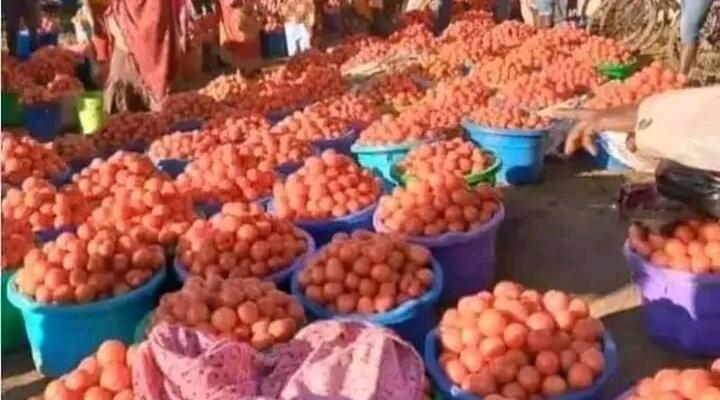
… experts tip govt, farmers on value addition, structured markets
It is no longer a secret that millions of people in Malawi are on the brink of extreme hunger. However, the year 2023 seem to be so unique as some commodities continue flooding the local markets, the latest being tomatoes.
It all started with a bumper yield of sweet potatoes earlier this year which experts said was due to good rainfall that provided conducive environment for the root crop to grow and do well in most parts of the country.
With the country experiencing a low harvest of maize which is Malawi’s staple crop, sweet potatoes flooded the market, took over and became the most regular on the table, a development which saw the root crop trending on social media because of its excess availability.
Unexpectedly, the root crop has registered an early death on the market, and tomatoes which were as expensive as glory some two to three months ago, have taken over, and become the current cheapest commodity in local markets.
In some markets in Blantyre, with only K100, one could buy at least six fresh and quality tomatoes, giving the consumer a wider range of options of how many tomatoes should spice up their relish contrary to how it was December last year.
But how does the grower feel with the oversupply of the commodity on the local market which has resulted into an extreme reduction of its price?
While consumers are enjoying the situation, Jimmy Kambewa a farmer who has travelled from Shape Valley in Ntcheu to Mbayani market in Blantyre to sell the product, is not happy with the current tomato situation.
Kambewa who looked hopeless and frustrated, told this publication that he is very worried that from a 20 litre bucket which he was earning not less than K25,000, he is now earning something around K6,000.
“I am not happy with these current tomato prices. We enjoyed at some point this year but not this time again. It has affected me honestly. My cost of production was around K300, 000, so you can relate with these prices,” worried Kambewa.
In his reaction, renowned Agriculture expert Dr Tamani Nkhono-Mvula said it is very worrisome that despite this overwhelming supply of tomatoes on the market, the commodity will be nowhere to be seen in no time.

Dr Nkhono-Mvula said this should be a wakeup call that in the country’s endeavours, authorities should consider coming up with policies and programs that will promote value addition.
“It’s unfortunate that much of this tomato is going to go to waste because we don’t have mechanisms to add value to most of these perishable crops. You see that most of the farmers that are producing, they are selling this tomato along the road as a fresh crop.
“But there isn’t much in terms of adding value to these tomatoes. But also even when you look at the industry itself, the industry itself, I don’t think there are companies in Malawi that are specializing in adding value to producing products out of the tomato,” said Nkhono-Mvula.
He further said this year’s production has indicated that the country has potential to produce as much tomatoes as it can, but added that it should not only stop at production, but going beyond production and start looking at how to make the commodity stay longer.
Another agriculture expert Dr Kingdom Kwapata, who is also a Biotechnology Research Scientist, is of the view that this year’s tomato situation will discourage farmers from growing the crop again.
Dr Kwapata said farmers spend a lot of money in production of tomatoes and the current prices may pose as an insult to the farmers since most of them will hardly make some profits.
“With bumper yields normally what happens in the final analysis is that they lead to the going down of prices. And when the prices go down because of oversupply of the commodity on the market, the farmers also become discouraged because they are not able to meet production costs.
“As you are aware, tomato requires a lot of pesticides in addition to fertilizer for it to do well. So these production costs may not be realized when there is overproduction on the market,” reacted Dr Kwapata.
Dr Kwapata further explained that the situation has been fuelled by lack of structured markets for the commodity which he urged the Malawi government to seriously look into.
Concurring with Nkhono-Mvula, Dr Kwapata further said tomato being a perishable commodity, Malawi Government need to start investing much in value addition, arguing that selling the product in its raw form will make tomato farming in Malawi to continue being profitless.
“So in this case, that is what government needs to do. We need to have structured markets so that our supply system can be predictable, not one day you have oversupply, and another day you have undersupply, like what we have seen in this current scenario.
“Government needs to come in to support value addition. We need to process our tomato into puree, tomato sauce, tomato juice, and other tomato products if we are to realize the true benefits of tomatoes,” added Kwapata.
Dr Kwapata has then advised farmers to never get overtaken by events or unfounded speculation saying if they will do so, they will end up overproducing which he said will always facilitate the going down of prices of the commodity on the market.
The expert further encouraged farmers to mobilize themselves into tomato cooperatives where they can be buying tomato processing equipment together, thereby promoting value addition which may at the end ensure the sustainability of the commodity in Malawi.
“As you know, tomato is a highly perishable product and because of this, post harvest losses are very high. But if farmers are in the cooperatives, they can afford to mobilize resource for the building of the coldrooms and other freezing equipment so that the tomato is preserved.
“They can also afford to purchase tomato processing equipment that could also enhance their production. We know that tomato is the number one most consumed horticulture product in the world. Maybe second followed by onions, but tomato is number one. And therefore the demand globally for tomato will always be there,” Kwapata.
He concluded by indicating that tomato could be Malawi’s competitive product on the African continent and globally if authorities will find markets in the Middle East, and the product can overtake even tobacco in terms of volumes of sales and revenue realization.
“For a long time we have looked down upon this commodity and really not taken it up seriously. But if we can focus in the manner which I’ve described, I think it can be a commodity to reckon with, that can propel this country’s economic situation forward at the same time also ensure that we realize the much needed forex,” he concluded.
Tomato production in Malawi is expected to reach 853,040 metric tons by 2026, a 3.5% year-on-year average growth rate, compared to 690,890 metric tons in 2021.














